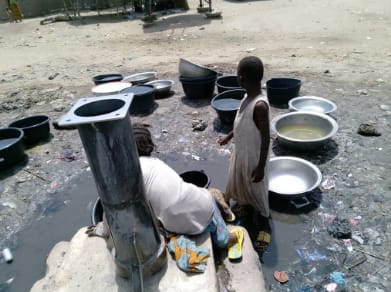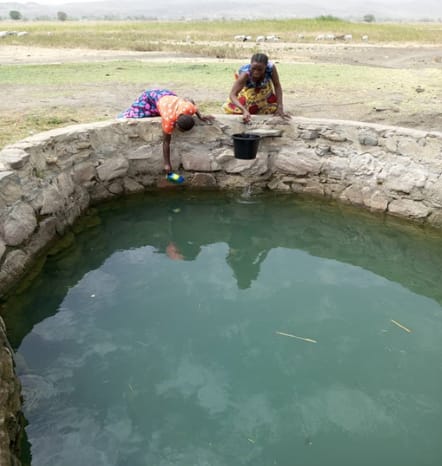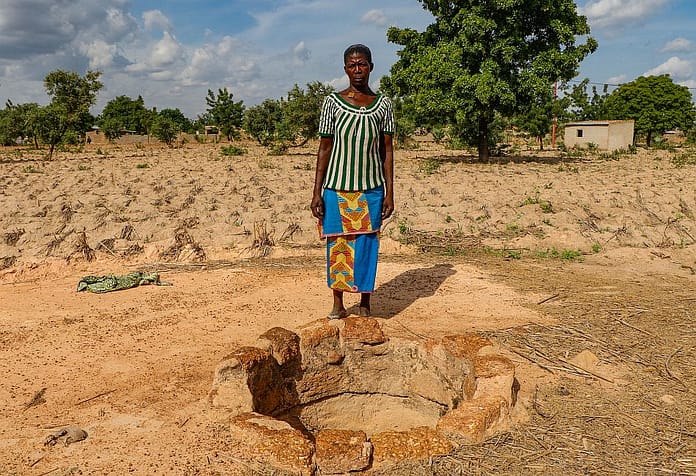By Okem Andrew, Charity Osei Amponsah and Tafida Ahmadu
A complex situation of extreme water scarcity is affecting internally displaced persons (IDPs) and endangering lives in Adamawa State. Inadequate access to clean water is worsened by the activities of non-state armed groups, which result in displacement, environmental degradation, and poor investment in infrastructure. Simultaneously, the increasing population and climate change impacts make marginalized groups more vulnerable, weakening their ability to withstand challenges like waterborne illnesses and malnutrition. One result of this fragility is a distressing increase in child mortality. As documented in part one, female residents and IDPs in the region are particularly, and dangerously, exposed to the impacts of water scarcity.

Women, water and access
A recent gender study by the International Water Management Institute in conflict-affected areas of Adamawa state provides in-depth insights into the vulnerability of water systems where every drop of water counts. The study fills critical knowledge gaps on water-related issues in conflict-affected communities with a particular focus on the gender implications in communities affected by persistent water stress, conflict and displacement. Results from the study comprising a sample of 390 respondents show that only 7.5% of participants said they never ran out of water. In contrast, others ran out of water occasionally (40%), frequently (29%), or even daily/severely (22.5%). Every aspect of everyday life is affected by water scarcity: 97.5% of respondents reported being unable to perform necessary tasks, including carrying out hygiene practices (80%), having to limit cooking (60%), and facing a lack of drinking water (55%).
More than 55% of respondents commute for more than 15 minutes each way to fetch water. These trips are risky, with 76.5% of women fetching water at night which increases their susceptibility to harassment, theft, and assault. In the words of a female respondent: “once it is night, I either go with my husband to fetch water or not go to save my dignity, in which case I have to use the small water at my disposal”. With few formal security patrols around remote water points, 43% of respondents fear the isolated locations in which water sources are found, and 39% actively encountered violence while gathering water for their families. Hours spent traversing insecure terrain also detract from productive economic activities that could otherwise be advancing the economic fortunes of these community members. Residents find it even more exasperating that the water collected from these treacherous journeys is frequently poor quality due to being extracted from open sources, contributing to waterborne disease. The waterborne diseases reported include typhoid (92%), cholera (59%), and diarrhoea (38%) and unfortunately these diseases are worsened by malnutrition, especially among children under five years old.

With sparse infrastructural support in congested camps, most IDPs lack reliable access to clean water, sanitation, or hygiene resources. Periods of extreme water shortage drive heightened tensions and conflicts within families and IDP settlements as all compete for the limited supplies of water. Women and girls consistently bear the harshest repercussions of water scarcity. They are often forced to prioritize water collection over other household chores, in line with accepted cultural norms. The drudgery associated with water collection exerts physical tolls and affects school attendance, which has negative implications for future prospects. Over half of the study respondents (51.5%) reported back/neck pains, while 46% described profound fatigue. Younger, pregnant and lactating women face greater biological water needs, intensifying bodily stress when supplies are scarce. About three in every five respondents (63.7%) cited care burdens amidst inadequate water as heavily constraining their economic participation. Mothers and caregivers experience further burdens caring for those falling ill from inadequate access to clean water. Over 70% of women reported intensified care duties amidst family health crises and working while personally sick from waterborne illness. The loss of economic productivity from this morbidity and mortality cripples prospects for IDP self-sufficiency. Without interventions, infectious outbreaks will remain cyclical occurrences, exacerbated during seasonal water shortages, hampering household well-being.
Normalizing access to clean water for IDP communities
Access to clean, regular water is hampered by a growing number of environmental issues and infrastructure constraints, which forces internally displaced people—primarily women and girls—to sacrifice their health, safety and valuable time in the ongoing struggle for access. As a result, there is a growing risk of normalizing avoidable deaths.
Acute water scarcity in conflict-displaced communities has far-reaching and destructive effects that highlight an urgent humanitarian intervention with gendered elements in Adamawa State. Some international NGOs have constructed latrines and hand-pump boreholes and distributed water treatment sachets to IDP communities. These current relief efforts establish basic water access and treatment measures but remain vastly insufficient and structurally temporary for sustaining water-related health needs. Factors such as remoteness, insecurity and population growth impede efforts. The evidence generated indicates that creative solutions using low-cost and easily accessible innovations and solutions can expand clean water availability. However, more personnel and supplies are desperately required to maintain and monitor infrastructure. While progress in access to water occurs in pockets, evidence generated through the project underscores the need for systemic momentum and investments to ensure access to water, a basic human right for vulnerable IDPs. This requires collaboration across stakeholders and mainstreaming gender transformative approaches in the design and implementation of water-related interventions.
Acknowledgements
This blog discusses IWMI’s work in Nigeria as part of the CGIAR Initiative on Fragility, Conflict, and Migration which receives funding from the Gender Impact Platform.



